新目标大学英语综合教程3综合训练课后阅读翻译
- 格式:docx
- 大小:30.93 KB
- 文档页数:8

Unit 1不丹1999才引进电视,是世界上最后一个开放电视与网络的国家,手机和互联网的普及率( penetra on )分别仅为30%和5%,几乎与现代化世界格格不入。
大多数人没有手机,也不上互联网,因此不太可能成为低头族( phubber )或者晚睡族(nightpersons)。
在别的国家拼命发展经济、不惜代价提升GDP 时,不丹追求的是国民幸福总值( Gross Na onal Happiness)。
他们乐于吸取现代技术的益处,但要按照自己的步伐,但要按照自己的步伐,根据自己的需要,根据自己的需要,根据自己的需要,在自已觉得合适的时机去进行。
在自已觉得合适的时机去进行。
在自已觉得合适的时机去进行。
他们同他们同样渴望经济繁荣,但不会以牺牲他们所珍视的传统和文化为代价。
样渴望经济繁荣,但不会以牺牲他们所珍视的传统和文化为代价。
Bhutan did not introduce TV until 1999, and is the last country that is open to TV and the Internet. Its mobile phone and Internet penetrations are as low as 30% and 5% respectively, almost out of tune with the modernized world. Now that the majority of its people have no mobile phones and no access to the Internet, they have little odds of being phubbers or night persons. While the other countries are striving desperately to develop economy and boost GDP at all costs, what Bhutan pursues is GNH (Gross National Happiness). They are willing to take advantage of modern technology, but would do it at their own pace, according to their own needs and at their own proper time. Although likewise thirsting for economic prosperity, Bhutan refuses to realize it at the price of their cherished tradition and culture.Unit 2中国的科举制度( the imperial examination system in China) 最早始于隋朝,历经1300多年。
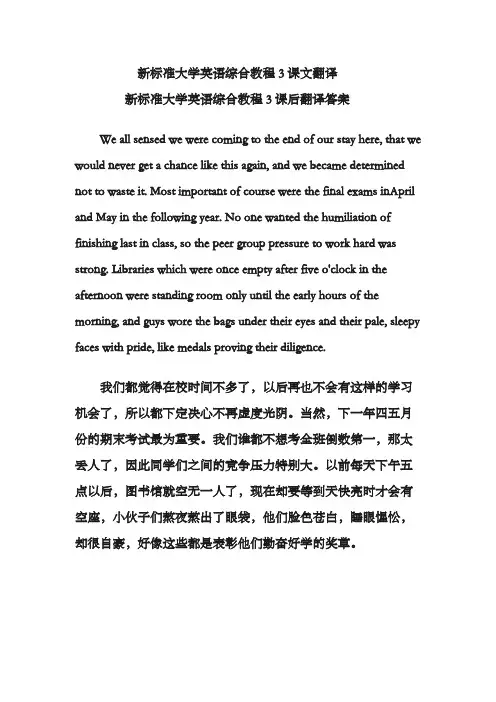
新标准大学英语综合教程3课文翻译新标准大学英语综合教程3课后翻译答案We all sensed we were coming to the end of our stay here, that we would never get a chance like this again, and we became determined not to waste it. Most important of course were the final exams inApril and May in the following year. No one wanted the humiliation of finishing last in class, so the peer group pressure to work hard was strong. Libraries which were once empty after five o'clock in the afternoon were standing room only until the early hours of the morning, and guys wore the bags under their eyes and their pale, sleepy faces with pride, like medals proving their diligence.我们都觉得在校时间不多了,以后再也不会有这样的学习机会了,所以都下定决心不再虚度光阴。
当然,下一年四五月份的期末考试最为重要。
我们谁都不想考全班倒数第一,那太丢人了,因此同学们之间的竞争压力特别大。
以前每天下午五点以后,图书馆就空无一人了,现在却要等到天快亮时才会有空座,小伙子们熬夜熬出了眼袋,他们脸色苍白,睡眼惺忪,却很自豪,好像这些都是表彰他们勤奋好学的奖章。
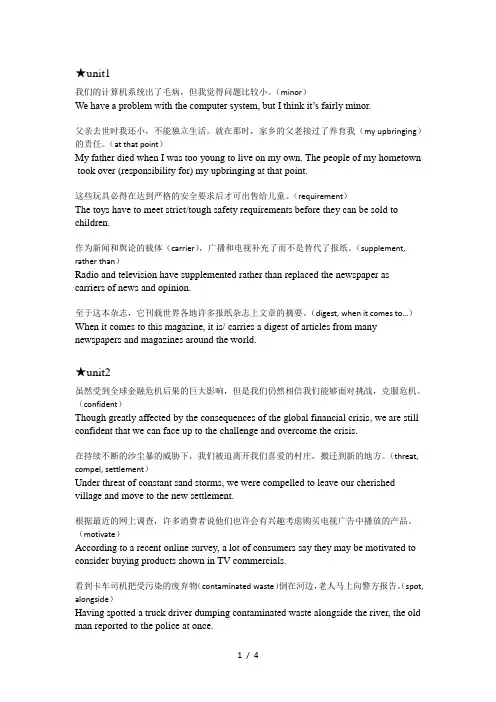
★unit1我们的计算机系统出了毛病,但我觉得问题比较小。
(minor)We have a problem with the computer system, but I think it’s fairly minor.父亲去世时我还小,不能独立生活。
就在那时,家乡的父老接过了养育我(my upbringing)的责任。
(at that point)My father died when I was too young to live on my own. The people of my hometown took over (responsibility for) my upbringing at that point.这些玩具必得在达到严格的安全要求后才可出售给儿童。
(requirement)The toys have to meet strict/tough safety requirements before they can be sold to children.作为新闻和舆论的载体(carrier),广播和电视补充了而不是替代了报纸。
(supplement, rather than)Radio and television have supplemented rather than replaced the newspaper as carriers of news and opinion.至于这本杂志,它刊载世界各地许多报纸杂志上文章的摘要。
(digest, when it comes to…)When it comes to this magazine, it is/ carries a digest of articles from many newspapers and magazines around the world.★unit2虽然受到全球金融危机后果的巨大影响,但是我们仍然相信我们能够面对挑战,克服危机。
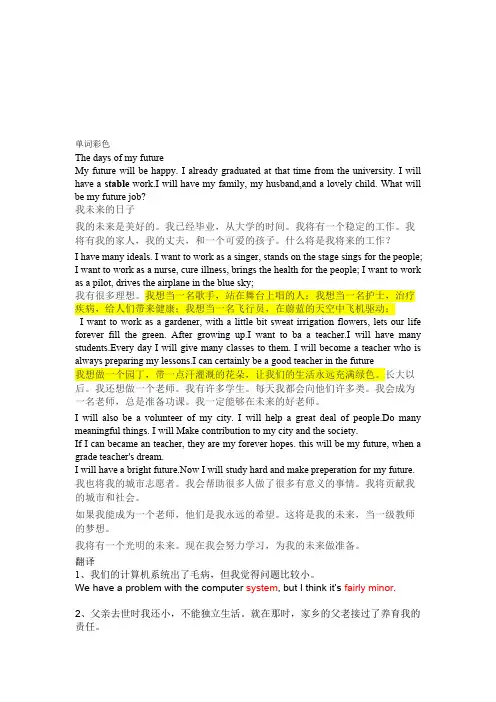
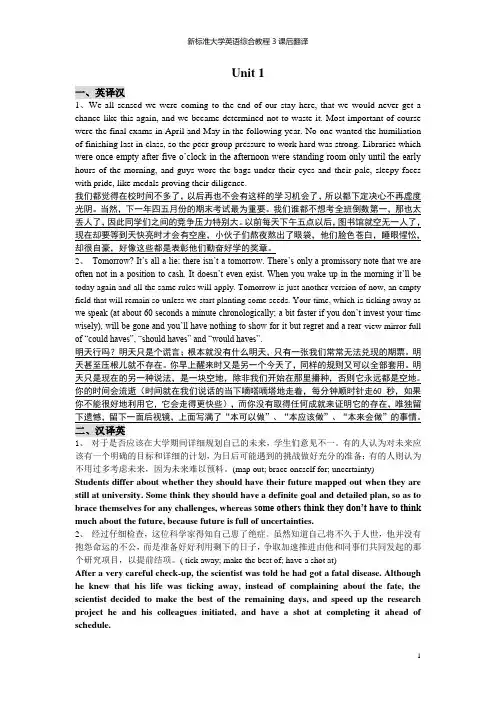
一、英译汉1、We all sensed we were coming to the end of our stay here, that we would never get a chance like this again, and we became determined not to waste it. Most important of course were the final exams in April and May in the following year. No one wanted the humiliation of finishing last in class, so the peer group pressure to work hard was strong. Libraries which were once empty after five o’clock in the afternoon were standing room only until the early hours of the morning, and guys wore the bags under their eyes and their pale, sleepy faces with pride, like medals proving their diligence.我们都觉得在校时间不多了,以后再也不会有这样的学习机会了,所以都下定决心不再虚度光阴。
当然,下一年四五月份的期末考试最为重要。
我们谁都不想考全班倒数第一,那也太丢人了,因此同学们之间的竞争压力特别大。
以前每天下午五点以后,图书馆就空无一人了,现在却要等到天快亮时才会有空座,小伙子们熬夜熬出了眼袋,他们脸色苍白,睡眼惺忪,却很自豪,好像这些都是表彰他们勤奋好学的奖章。
2、Tomorrow? It’s all a lie; there isn’t a tomorrow. There’s only a promissory note that we are often not in a position to cash. It doesn’t even exist. When you wake up in the morning it’ll be today again and all the same rules will apply. Tomorrow is just another version of now, an empty field that will remain so unless we start planting some seeds. Your time, which is ticking away as we speak (at about 60 seconds a minute chronologically; a bit faster if you don’t invest your ti me wisely), will be gone and you’ll have nothing to show for it but regret and a rear-view mirror full of “could haves”, “should haves” and “would haves”.明天行吗?明天只是个谎言;根本就没有什么明天,只有一张我们常常无法兑现的期票。
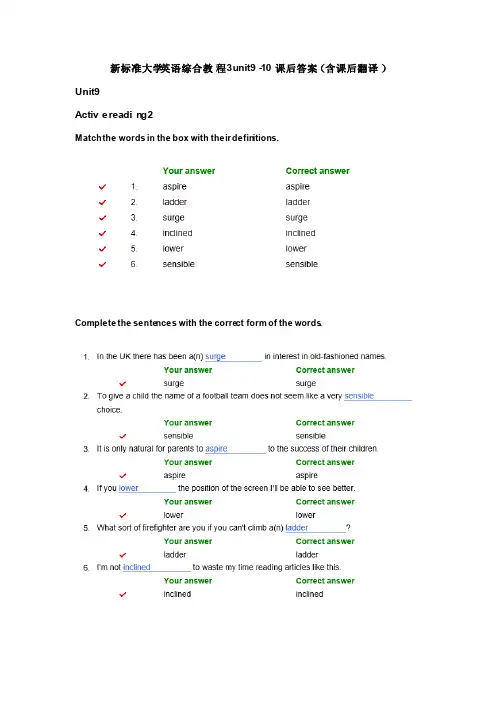
新标准大学英语综合教程3 unit9-10 课后答案(含课后翻译)Unit9Active readin g 2Matchthe wordsin the box with theirdefini tions.Comple te the senten ces with the correc t form of the words.Choose the rightwordsor expres sions to comple te the senten ces.a b a b b b a b a bLangua ge in useRewrit e the senten ces using-someth ing or -odd.1. Thereare about20 people waitin g in the corrid or outsid e.Thereare twenty-odd people waitin g in the corrid or outsid e.2. The new lectur er is betwee n 50 and 60, I think.The new lectur er is fifty-someth ing, I think.3. Why don't you invite all your friend s who are in theirthirti es?Why don't you invite all your thirty-someth ing friend s?4. I reckon that therewere 200 people in the cinema.Therewere two hundre d-odd people in the cinema.5. I don't know how old she is, maybebetwee n 70 and 80.I don't know how old she is, maybesevent y-someth ing.Rewrit e the senten ces usingas much / many ... as ther is / are. Follow the exampl e.1.In Britai n for every curiou s surnam e there is an intere sting place name.Thereare as many curiou s surnam es in Britai n as thereare intere sting placenames.2.For each commun ity in the capita l thereis a majorcultur al festiv al.Thereare as many majorcultur al festiv als in the capita l as thereare commun ities.3.Thereis a lot of confus ion aboutthe new traffi c rules, and thereis the same amount of dissat isfac tionaboutthe change s in the openin g hoursof shops.Thereis as much confus ion aboutthe new traffi c rulesas thereis dissat isfac tionaboutthe change s in the openin g hoursof shops.4.For each member of our organi zatio n thereis a differ ent opinio n aboutwhat we shoulddo.Thereare as many differ ent opinio ns aboutwhat we should do as thereare member s of our organi zatio n.5.I've got the feelin g that the number of proble ms to resolv e on this projec t is equiva lentto the number of starsin the sky.Thereare as many proble ms to resolv e on this projec t as thereare starsin the sky.1. Who doesn't suppor t the policy?Femini sts.2. How long has the policy worked?Hundre ds of years.3. Who doesn't want to see it abused?Icelan dic people.4. If the policy change d, what mightsome people want to do?They mightwant to give theirchildr en unusua l names.5. What is Snowmo bilean exampl e of?It is an exampl e of a ridicu lousname and abuseof the naming system.Read the explan ation s of the words. Answer the questi ons.1.(a)Ten to one.(b)I will have a ration al attitu de.(c)They are toally unreas onabl e.(d)No, it is rather large.2.(a)Yes, becaus e people pay you a largeamount of money.(b)Growin g cities(c)No, I am not really hungry.3.(a)Machin es are a myster y to me.(b)Yes, I have to sit next week's test.(c)No, I thinknamesneed to be more imagin ative.4.(a)Spendi ng a lot.(b)A sudden increa se in powerflow caused by someth ing like lightn ing may damage electr icalapplia nces.(c)No, run, becaus e people are sudden ly rushin g toward s you like a wave on a beach.(d)When a sudden powerf ul emotio n fillsyou, it is very diffic ult to contro l.5.(a)Yes, or things will be disorg anize d.(b)No, thereis plenty of public transp ort to use.(c)I thinkit is mainly becaus e they want a change.(d)Yes, or else I cannot revise laterTransl ate the paragr aphsinto Chines e.1. In Europe, the Romans starte d callin g people by theirgivenname and family name in Latinfrom 300 BC, but it wasn't common practi ce throug houtEurope untilthe 10th or 11th centur y, when first, the lordsand gentry, then middle-classcitize ns, and finall y everyo ne used surnam es. The necess ity for surnam es arosewhen the popula tionbeganto grow. Sudden ly therewas more than one person with the same name in a villag e, so surnam es were used. Genera lly, thesesurnam es were not handed down to the next genera tion, but afterthe fall of the RomanEmpire, Irelan d was one of the firstcountr ies to adoptheredi tarysurnam es, and Irishsurnam es are foundas earlyas the10t h centur y.在欧洲,罗马人从公元前300年起就用拉丁文的姓和名来称呼别人,但是一直到公元10或者11世纪,这种做法才在整个欧洲流行起来,最先是在贵族阶层中间,然后是城市的中产阶级,到最后所有人都开始使用姓氏。
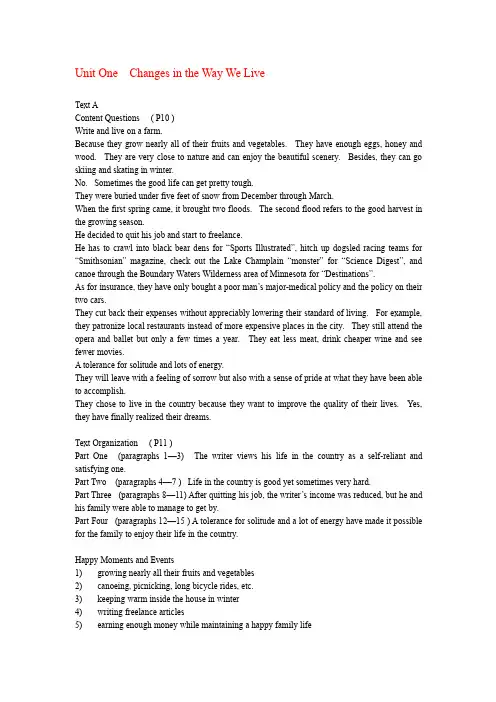
Unit One Changes in the Way We LiveText AContent Questions(P10)Write and live on a farm.Because they grow nearly all of their fruits and vegetables.They have enough eggs,honey and wood.They are very close to nature and can enjoy the beautiful scenery.Besides,they can go skiing and skating in winter.No.Sometimes the good life can get pretty tough.They were buried under five feet of snow from December through March.When the first spring came,it brought two floods.The second flood refers to the good harvest in the growing season.He decided to quit his job and start to freelance.He has to crawl into black bear dens for“Sports Illustrated”,hitch up dogsled racing teams for “Smithsonian”magazine,check out the Lake Champlain“monster”for“Science Digest”,and canoe through the Boundary Waters Wilderness area of Minnesota for“Destinations”.As for insurance,they have only bought a poor man’s major-medical policy and the policy on their two cars.They cut back their expenses without appreciably lowering their standard of living.For example, they patronize local restaurants instead of more expensive places in the city.They still attend the opera and ballet but only a few times a year.They eat less meat,drink cheaper wine and see fewer movies.A tolerance for solitude and lots of energy.They will leave with a feeling of sorrow but also with a sense of pride at what they have been able to accomplish.They chose to live in the country because they want to improve the quality of their lives.Yes, they have finally realized their dreams.Text Organization(P11)Part One(paragraphs1—3)The writer views his life in the country as a self-reliant and satisfying one.Part Two(paragraphs4—7)Life in the country is good yet sometimes very hard.Part Three(paragraphs8—11)After quitting his job,the writer’s income was reduced,but he and his family were able to manage to get by.Part Four(paragraphs12—15)A tolerance for solitude and a lot of energy have made it possible for the family to enjoy their life in the country.Happy Moments and Events1)growing nearly all their fruits and vegetables2)canoeing,picnicking,long bicycle rides,etc.3)keeping warm inside the house in winter4)writing freelance articles5)earning enough money while maintaining a happy family lifeHardships1)working hard both in winter and in summer2)harsh environment and weather condition3)anxious moments after the writer quit his job4)cutting back on daily expenses5)solitudeVocabulary1.Fill in the gaps with words or phrases given in the box.(P15)1)on balance2)resist3)haul4)wicked5)illustrated6)budget7)lowering8)boundary9)involved10)economic11)blasting12)just about2.Now use the verb in brackets to form an appropriate phrasal verb you have learned and complete the sentence with it.(P16)1)cut back/down2)pick up3)get by4)get through5)face up to6)turn in7)making up for8)think up3.Rewrite each sentence with the word or phrase in brackets,keeping the same meaning.(P17)1)pursued his mathematical studies and taught himself astronomy.2)often generate misleading thoughts.3)attach great importance to combining theory with practice in our work.4)be suspected of doing everything for money.5)before he gets through life.plete the sentences,using the words or phrases in brackets(P17)1.their indoor a profit to invest in2.device the improvement on a global scale3.stacked temptation never dined outConfusable Use(P18)househomehome familyhouseholddoubtsuspecteddoubtedsuspectedsuspectWord Formation(P19)1)rise2)final3)regular4)cash5)hows and whys6)upped7)yellowed8)bottled9)lower10)searchCloze1.Text-related(P20)1)gets by2)temptation3)get through4)improvement5)aside from6)suspect7)supplement8)profit9)stacking2.Theme-related(P21)1)replaced2)consider3)quit4)world5)tough6)fuels7)provide8)luxuries9)balance10)idealTranslation1.Translate the sentences into English(P21)1)We have a problem with the computer system,but I think it is fairly minor.2)My father died when I was too young to live on my own.The people of my hometown took over responsibility for my upbringing at that point.3)the toys have to meet strict safety requirements before they can be sold to children.4)Radio and television have supplemented rather than replaced the newspaper as carriers of new and opinion.5)When it comes to this magazine,it is a digest of articles from many newspapers and magazines around the world.2.Translate the passage into English(P21)A decade ago,Nancy did what so many Americans dream about.She quit an executive position and opened a household device store in her neighborhood.People like Nancy made the decision primarily for the improvement in the quality of their lives.But,to run a business on a small scale is by no means an easy job.Without her steady income,Nancy had to cut back on her daily expenses.Sometimes she did not even have the money to pay the premiums for the various kinds of insurance she needed.Fortunately,through her own hard work,she has now got through the most difficult time.She is determined to continue pursuing her vision of a better life.Text B1.Choose the best answer for each of the following.(P27)1—6.a c d b a cTranslate into Chinese the underlined sentences in the essay(P28)什么?你说那听起来不像你府上的生活?其实,不仅仅是你一个人这么想。
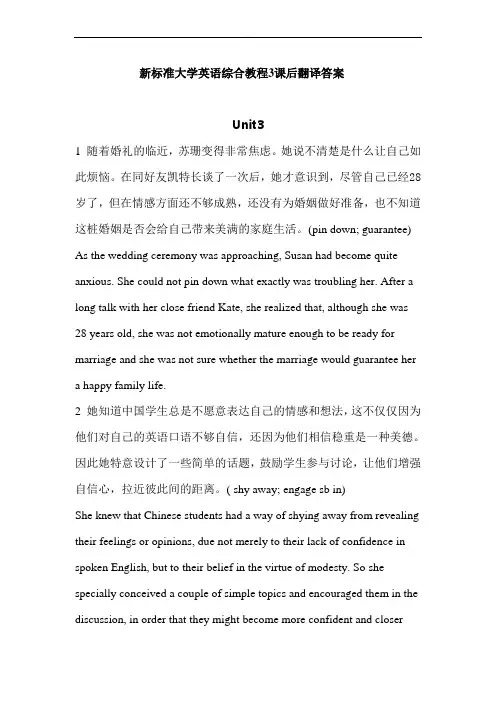
新标准大学英语综合教程3课后翻译答案Unit31 随着婚礼的临近,苏珊变得非常焦虑。
她说不清楚是什么让自己如此烦恼。
在同好友凯特长谈了一次后,她才意识到,尽管自己已经28岁了,但在情感方面还不够成熟,还没有为婚姻做好准备,也不知道这桩婚姻是否会给自己带来美满的家庭生活。
(pin down; guarantee) As the wedding ceremony was approaching, Susan had become quite anxious. She could not pin down what exactly was troubling her. After a long talk with her close friend Kate, she realized that, although she was 28 years old, she was not emotionally mature enough to be ready for marriage and she was not sure whether the marriage would guarantee hera happy family life.2 她知道中国学生总是不愿意表达自己的情感和想法,这不仅仅因为他们对自己的英语口语不够自信,还因为他们相信稳重是一种美德。
因此她特意设计了一些简单的话题,鼓励学生参与讨论,让他们增强自信心,拉近彼此间的距离。
( shy away; engage sb in)She knew that Chinese students had a way of shying away from revealing their feelings or opinions, due not merely to their lack of confidence in spoken English, but to their belief in the virtue of modesty. So she specially conceived a couple of simple topics and encouraged them in the discussion, in order that they might become more confident and closerwith each other.Unit41 我们根本就看不懂他们的计划书,因为他们的观点不太容易把握。

Unit 1-1Catching crabs1 In the fall of our final year, our mood changed. The relaxed atmosphere of the preceding summer semester, the impromptu ball games, the boating on the Charles River, the late-night parties had disappeared, and we all started to get our heads down, studying late, and attendance at classes rose steeply again. We all sensed we were coming to the end of our stay here, that we would never get a chance like this again, and we became determined not to waste it. Most important of course were the final exams in April and May in the following year. No one wanted the humiliation of finishing last in class, so the peer group pressure to work hard was strong. Libraries which were once empty after five o'clock in the afternoon were standing room only until the early hours of the morning, and guys wore the bags under their eyes and their pale, sleepy faces with pride, like medals proving their diligence.2 But there was something else. At the back of everyone's mind was what we would do next, when we left university in a few months' time. It wasn't always the high flyers with the top grades who knew what they were going to do. Quite often it was the quieter, less impressive students who had the next stages of their life mapped out. One had landed a job in his brother's advertising firm in Madison Avenue, another had got a script under provisional acceptance in Hollywood. The most ambitious student among us was going to work as a party activist at a local level. We all saw him ending up in the Senate or in Congress one day. But most people were either looking to continue their studies, or to make a living with a white-collar job in a bank, local government, or anything which would pay them enough to have a comfortable time in their early twenties, and then settle down with a family, a mortgage and some hope of promotion.3 I went home at Thanksgiving, and inevitably, my brothers and sisters kept asking me what I was planning to do. I didn't know what to say. Actually, I did know what to say, but I thought they'd probably criticize me, so I told them what everyone else was thinking of doing.4 My father was watching me but saying nothing. Late in the evening, he invited me to his study. We sat down and he poured 抓螃蟹1.大学最后一年的秋天,我们的心情变了。
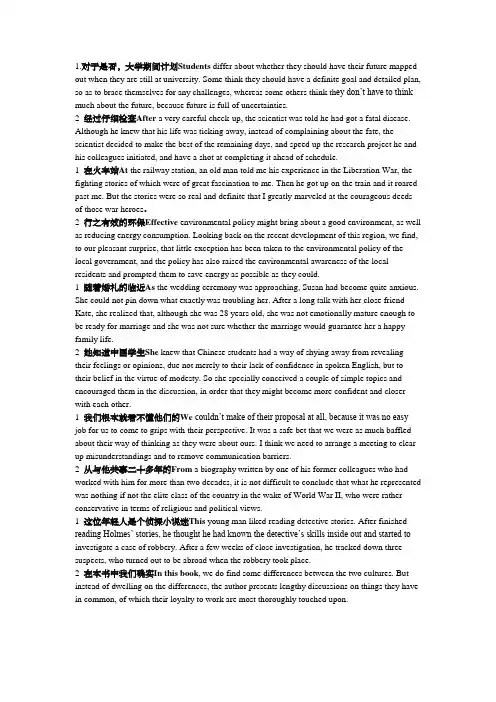
out when they are still at university. Some think they should have a definite goal and detailed plan, so as to brace themselves for any challenges, whereas some others think th ey don’t have to think much about the future, because future is full of uncertainties.2 经过仔细检查After a very careful check-up, the scientist was told he had got a fatal disease. Although he knew that his life was ticking away, instead of complaining about the fate, the scientist decided to make the best of the remaining days, and speed up the research project he and his colleagues initiated, and have a shot at completing it ahead of schedule.1 在火车站At the railway station, an old man told me his experience in the Liberation War, the fighting stories of which were of great fascination to me. Then he got up on the train and it roared past me. But the stories were so real and definite that I greatly marveled at the courageous deeds of those war heroes。

新标准大学英语综合教程3课后翻译答案Unit11 对于是否应该在大学期间详细规划自己的未来,学生们意见不一。
有的人认为对未来应该有一个明确的目标和详细的计划,为日后可能遇到的挑战做好充分的准备;有的人则认为不用过多考虑未来,因为未来难以预料。
(map out; brace oneself for; uncertainty)Students differ about whether they should have their future mapped out when they are still at university. Some think they should have a definite goal and detailed plan, so as to brace themselves for any challenges, whereas some others think they don’t have to think much about the future, because future is full of uncertainties.2 经过仔细检查,这位科学家得知自己患了绝症。
虽然知道自己将不久于人世,他并没有抱怨命运的不公,而是准备好好利用剩下的日子,争取加速推进由他和同事们共同发起的那个研究项目,以提前结项。
( tick away; make the best of; have a shot at)After a very careful check-up, the scientist was told he had got a fatal disease. Although he knew that his life was ticking away, instead of complaining about the fate, the scientist decided to make the best of the remaining days, and speed up the research project he and his colleagues initiated, and have a shot at completing it ahead of schedule.Unit21 在火车站上,有一位老人给我讲述了他参加解放战争的经历,那些战斗故事对我有着极大的吸引力。
单词彩色The days of my futureMy future will be happy. I already graduated at that time from the university. I will have a stable work.I will have my family, my husband,and a lovely child. What will be my future job?我未来的日子我的未来是美好的。
我已经毕业,从大学的时间。
我将有一个稳定的工作。
我将有我的家人,我的丈夫,和一个可爱的孩子。
什么将是我将来的工作?I have many ideals. I want to work as a singer, stands on the stage sings for the people;I want to work as a nurse, cure illness, brings the health for the people; I want to work as a pilot, drives the airplane in the blue sky;我有很多理想。
我想当一名歌手,站在舞台上唱的人;我想当一名护士,治疗疾病,给人们带来健康;我想当一名飞行员,在蔚蓝的天空中飞机驱动;I want to work as a gardener, with a little bit sweat irrigation flowers, lets our life forever fill the green. After growing up.I want to ba a teacher.I will have many students.Every day I will give many classes to them. I will become a teacher who is always preparing my lessons.I can certainly be a good teacher in the future我想做一个园丁,带一点汗灌溉的花朵,让我们的生活永远充满绿色。
大学英语综合教程3课后翻译Unit11.我们的计算机系统出了毛病,但我觉得问题不大。
We have a problem with the computer system, but I think it’s fairly minor.2.父亲去逝的时候我还小,不能独立生活。
就在那时,家乡的父老接过了教育我的责任。
My father died when I was too young to live on my own. The people of my hometown took over my upbringing at that point.3.这些玩具必须得达到严格的安全要求后才可出售给儿童。
The toys have to meet strict safety requirements before they can be sold to children.4.作为新闻和舆论的载体,广播和电视补充了而不是替代了报纸。
Radio and television have supplemented rather than replaced the newspaper as carriers of news and opinion.5.至于这本杂志,它刊载了世界各地许多报纸杂志上文章的摘要。
When it comes to this magazine, it is/ carries a digest of articles from many newspapers and magazines around the world.十年之前,南希做了许许多多美国人梦寐以求的事。
她辞去了经理职位,在邻近地区开了一家家用器材商店。
像南希这样的人作出这种决定主要是出于改善生活质量的愿望。
然而,经营小本生意绝非易事。
在失去稳定的收入后,南希不得不削减日常开支。
有时候她甚至没有钱支付她所需要的种种保险的费用。
有一次她连电话费也付不起,只得向她的父母亲借钱。
Together with the National Libraries of Scotland and Wales, the Bodleian Library in Oxford, the Cambridge University Library and Trinity College's library in Dublin, the British Library is now empowered to receive a copy of every U.K. electronic publication. This is a logical enough extension in the digital age of its ancient right to receive and store all books, newspapers, magazines and other printed matter, but it is still a challenging task. The first full-scale Internet “crawl” was launched from the library’s West Yorkshire computer center shortly after the law took effect. Covering 4.8 million U.K. sites, it took three months to complete, with another two months required to process the 1 billion captured web pages. The expectation is that the library will collect in a single year about the same amount of material as its newspaper and periodicals archive has amassed over the course of three centuries (a costly program to digitize some 40 million of its 750 million printed pages is now underway). Chief Executive Rolv Keating points out that when the initial crawl began, the project represented a reassertion of what it means to be a library in the 21st century. Ten years ago, there was a very real danger of a black hole opening up and swallowing our digital heritage." Keating says. "Millions of web pages, e-publications and other nonprint items were falling through the cracks of a system devised primarily to capture ink and paper.' Professor Niels Brugger, the head of the Center for Internet Studies at Denmark’s Aarhus University, supports the British Library’s archiving project. “More and more of our societal, cultural and political actives now take place either on the web or are closely related to it” he says. “Since the mid-1990s, you simply couldn’t be a university, a company or a political party without having a website. If want to document our present or study our past on the web, get it into an archive before it disappears.” “Whenever I’m asked why web archiving matters,” he continues, “I think of the Bob Dylan line from The Times They Are Changing — 'The present now will later be past. ‘Material is disappearing before our eyes at an unprecedented rate, and with it goes precious source material for the future historian who will be trying to shed light on the present. Capturing the past for posterity through web archiving matters just as much as preserving other aspects of our cultural heritage, whether it’s kitchen utensils, buildings, warships or collections of newspapers. Studies suggest that 40 percent of what's on it at any given moment is deleted a year later, while another 40 percent has been altered, leaving just 20 percent of the original content.” Almost every major national library in Europe now undertakes web arching. Though the scale and cost of such operations vary widely according to their individual remit. The British Library’s project cost some $5 million to set up, the money coming entirely from its grant from the Department of Culture, Media and Sport. 现在,大英图书馆与苏格兰和威尔士国家图书馆、牛津大学的博德利图书馆、剑桥大学图书馆和都柏林三一学院图书馆一起,有权接收英国所有电子出版物的副本。在数字时代,这是一个合乎逻辑的延伸,因为它拥有接收和储存所有书籍、报纸、杂志和其他印刷品的古老权利,但这仍然是一项具有挑战性的任务。 该法律生效后不久,图书馆西约克郡计算机中心启动了第一个全面的互联网“爬行”。它覆盖了480万个英国网站,花了3个月的时间才完成,另外两个月需要处理10亿个被捕获的网页。人们预计,该图书馆在一年内收集的资料量,将与它的报纸和期刊档案馆在过去三个世纪积累的资料量相当(一项耗资巨大的计划正在进行,将其7.5亿页印刷资料中的4000万页数字化)。 图书馆首席执行官罗尔夫·基廷(Rolv Keating)指出,最初的爬行开始时,这个项目代表着对图书馆在21世纪意义的重申。十年前,我们面临着一个非常现实的危险:一个黑洞正在打开,吞噬我们的数字遗产。基廷说。“数以百万计的网页、电子出版物和其他非印刷品从一个主要用于捕捉墨水和纸张的系统的缝隙中滑落。” 丹麦奥尔胡斯大学(Aarhus University)互联网研究中心(Center for Internet Studies)主任尼尔斯·布鲁格(Niels Brugger)教授支持大英图书馆的存档项目。他表示:“我们越来越多的社会、文化和政治活动要么发生在网络上,要么与之密切相关。”“自上世纪90年代中期以来,如果没有网站,你就不可能成为一所大学、一家公司或一个政党。”如果你想在网上记录我们的现在或者研究我们的过去,在它消失之前把它归档。 “每当有人问我为什么网络档案很重要时,”他继续说,“我就会想起鲍勃•迪伦(Bob Dylan)在他们正在改变的时代说过的话——‘现在的现在以后会成为过去。’”“材料正以前所未有的速度消失在我们的眼前,对于未来的历史学家来说,这些珍贵的原始材料也将随之消失,而未来的历史学家将试图揭示当下的真相。”通过网络档案为我们的子孙后代捕捉过去,就像保护我们文化遗产的其他方面一样重要,无论是厨房用具、建筑、军舰还是报纸收藏。研究表明,在任何一个特定的时刻,40%的内容会在一年后被删除,而另外40%的内容会被修改,只剩下20%的原始内容。 现在欧洲几乎每一个主要的国家图书馆都承担着网络拱架的工作。尽管这些行动的规模和费用因其各自的职责而有很大差别。大英图书馆的这个项目耗资约500万美元,资金全部来自文化、媒体和体育部的拨款。
If you're on Facebook, there's a roughly 0.04 percent chance the social media giant used you for a psychology- experiment in early 2012, though you'd have had no way of knowing at the time and indeed would only be finding out about the experiment this week. That's what happened when researchers used nearly 700,000 Facebook users as guinea pigs for a study on “emotional contagion.” In brief, the study separated its users into two groups. One was subjected to a newsfeed of primarily positive posts; the other was flooded with emotionally negative items. The results "suggest that the emotions expressed by friends, via online social networks, influence our own moods, constituting, to our knowledge, the first experimental evidence for massive-scale emotional contagion via social networks,' 1 the researchers write in a paper now published in the Proceedings of the National Academy of Science. In other words, the study confirmed what heavy Facebook users have long known to be true: what your friends post on Facebook can have a tangible impact on your own emotional state. Facebook hasn’t been able to manipulate the reactions of users who have learned about the study's existence: people are vexed. Over the weekend, observers blasted the experiment as scandalous and disturbing, and according to The Guardian, one British MP has gone so far as to call for a parliamentary investigation into how it was carried out. Adam Kramer, Facebook's data scientist and a coauthor of the study, took to his own Facebook page to offer a defense. “The goal of all of our research at Facebook is to learn how to provide a better service,” Kramer writes. “Having written and designed this experiment myself, I can tell you that our goal was never to upset anyone.” Still, he goes on to concede that those aims weren’t made particularly clear and that the research conclusions “may not have justified all of this anxiety.” That’s probably an understatement.